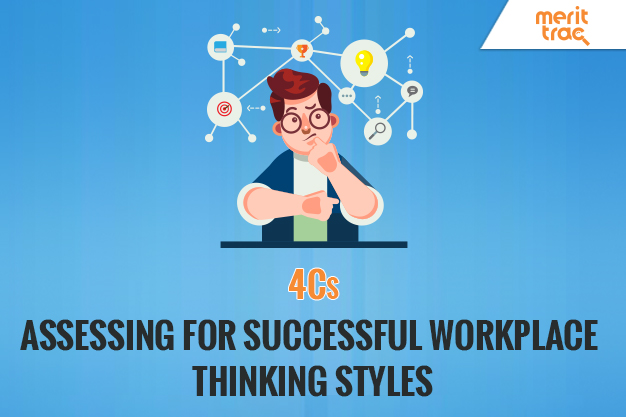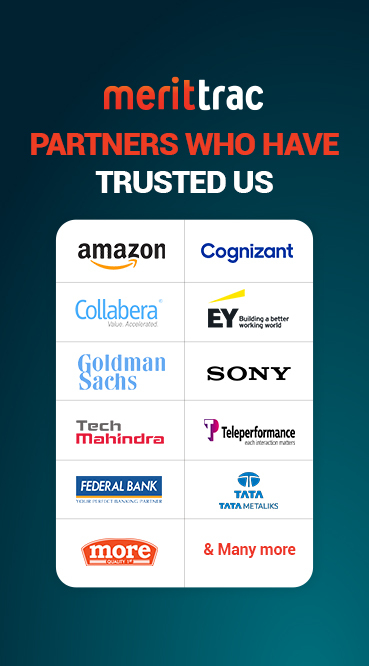
4Cs: Assessing for Successful Workplace Thinking Styles
Date: 21/05/2019 | Posted by: MeritTrac | Category: Corporate , Soft Skills
The VUCA (Volatile, Uncertain, Complex and Ambiguous) environment of Industry 4.0 calls for organizations and employees to continuously transform and adapt in order to succeed. While the technological innovations demand domain-specific hard skills, evolving customer and market requirements demand a range of soft skills in today’s employees. The 4 Cs – critical thinking, collaboration, customer-centricity and creativity - are emerging as the four critical employee thinking styles that drive successful team and customer outcomes. The challenge is, these skills are not apparent from a resume and are hard to assess even in a personal interview, making it difficult for employers to identify right fit candidates. So what’s the way out? The answer lies in using scientifically designed online psychometric assessment tools that offer a rigorously validated way to evaluate these - “hard to assess soft skills”.
According to the Global Talent Trends 2019 report, 89% of talent professionals stated that new hires lack these critical soft skills, making it vital for employers to assess candidates for the following 4Cs.
Critical thinking
As artificial intelligence (AI) and machine learning (ML) lead the digital transformation wave across industries, the nature of jobs in the future will be very different from what we see today. An Oxford University study reveals that jobs such as telemarketer, data entry clerk and insurance underwriter have a 99% chance of being automated, whereas jobs like social workers and emergency management have less than 1% chance of being automated. This means the ability to thoroughly vet assumptions and interpret unstructured data is crucial for the jobs of tomorrow - across departments.
Critical thinking, however, goes beyond technical efficacy and covers other key areas such as improving customer interactions and asking questions that drive business improvement. As the demand for employees with strong logic and reasoning capabilities rises, global organizations such as Citibank are using automated online assessments to evaluate candidates on critical reasoning and numerical reasoning skills during hiring. The ones most sought are: behavioural assessments, cognitive thinking, willingness to learn, workplace thinking styles, personality tests, etc.
Collaboration
Simply put, the future of work is collaborative. Collaboration is critical to producing high quality ideas, creating an effective work culture, and ensuring employee satisfaction. In a study by Salesforce, 86% of executives and employees cited lack of collaboration for workplace failures. Other studies show that groups tend to be more efficient in terms of time management, problem detection and solutions, and people working in interactive teams experience higher job engagement.
Forward-looking companies trying to nurture high performing teams are adopting role-driven ownership instead of top-down hierarchy and investing in developing leaders at all levels. Leveraging personality assessments such as Myers-Briggs, Big Five, DiSC can not only help identify candidates who are team players but also create self-awareness and understanding among employees in order to build strong teams.
Customer-centricity
The Internet-of-things has made the world much smaller and more connected. Today’s customers are savvy and demanding as there is no dearth of choices. Brands realize the need to stay ahead - both in anticipating and fulfilling their customer’s needs – in order to ensure customer loyalty and growth. E-commerce giant Amazon serves 137M customers a week and is always ahead of its customers’ needs with the help of a highly efficient and customer-centric workforce. Predictive assessments help employers gauge candidate’s customer-centricity by assessing their levels of empathy, patience and resilience. Xerox, for instance, screens its employees for compassion using pre-employment tests.
Creativity
Creativity and innovation go hand-in-hand in today’s evolving technology and business models. Finding solutions to the problems of the digital-age require employees to exercise out-of-the-box thinking and be comfortable with taking risks. Companies like Google and Lego understand that hiring creative candidates is critical to their innovation-driven growth agendas. Google allows its employees to routinely set aside 20% of their time for creative projects while Lego carried out a business turn-around by channelizing its creative internal resources to identify new markets and build new products. A combination of different kinds of pre-hire assessments such as cognitive ability tests and personality tests come to the rescue of such employers by predicting the ability of candidates to perform once they join the team.
As organizations prepare for the future of work in a rapidly evolving digital era, hiring candidates with critical workplace thinking styles can create competitive advantage in the form of new ideas and faster time to market. Scientifically designed automated assessment tools for hiring not only ensure that new hires have the necessary skillsets but also identify employees who are best suited for promotion to certain roles.
Sources:
- business.linkedin.com
- telegraph.co.uk
- jobtestprep.com
- forbes.com
- gettingsmart.com
- itproportal.com
- issuu.com
Handpicked Articles for Futher Reading
Relevant Case Studies/Whitepapers:













 Sales Hotline: USA: +1 646 916 0939 / Others: +91 80619 14700
Sales Hotline: USA: +1 646 916 0939 / Others: +91 80619 14700


